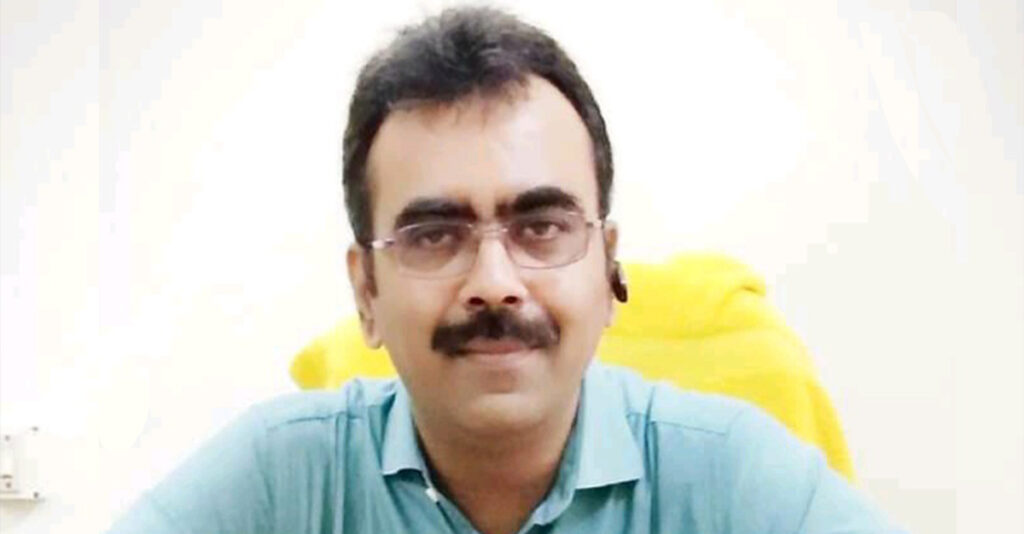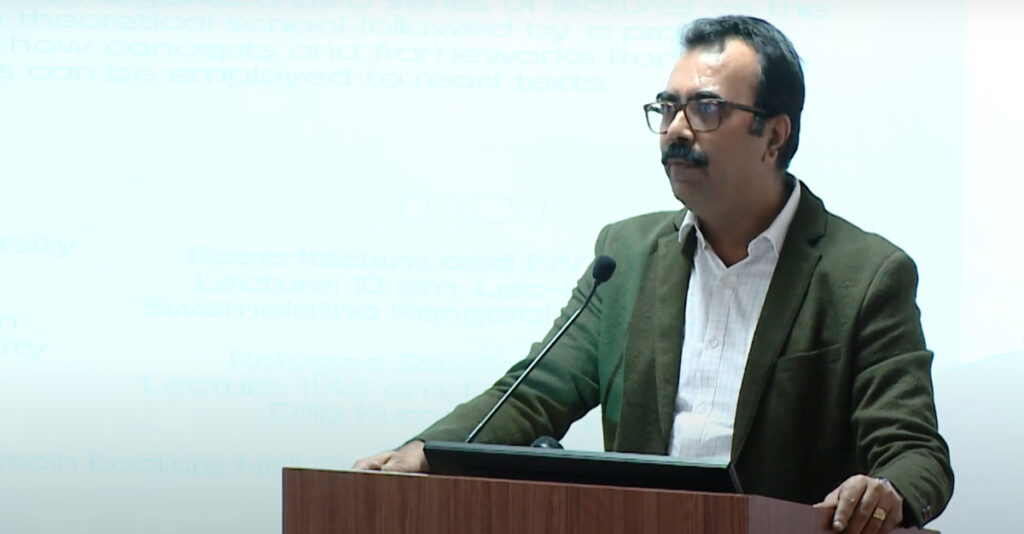In Conversation with Professor Bibhash Choudhury
Dr. Mridul Bordoloi
Bibhash Choudhury is Professor in the Department of English, Gauhati University. He has authored many books, which include English Social and Cultural History; Amitav Ghosh: Critical Essays; Deconstruction and Poststructuralism and Reading Postcolonial Theory: Key Texts in Context. He also writes scholarly articles in Assamese, regularly contributing essays, articles, and book reviews in Assamese newspapers, periodicals and journals, besides writing a weekend column every fortnight titled ‘Loving Literature’ in the highly-circulated and respected English daily, The Assam Tribune. Professor Choudhury is a renowned teacher and academic, whose lectures have inspired a generation of students to commit themselves to rigorous scrutiny of literary texts and taking up research. In this conversation he addresses a few queries on poetry and gives his invaluable insights on the relevance of poetry in the present and the future.

Do you think that the tradition of Assamese poetry has evolved over time?
The Assamese poetic tradition has had a long, rich and fascinating history. As with all literary currents, the oeuvre of different poets show both textural variations and enhancements of practices that have continued in a variety of formats. In the twentieth century, the infusion of Western thought and its integration into the fabric of Assamese poetic practice was not a seamless process always, but there is no denying the recognition of what came from shores beyond our land. One aspect that is strikingly different in terms of the cajoling of Romanticism well into the vitals of a Modernist consciousness in Assamese poetry is evident in the accommodation of registers that refer to what are insistently homegrown images and expressions, and this something that makes modern Assamese poetry dialogic in nature. The best of our poetic minds converse with ideas that emerge from an inwardness with our cultural repositories which is then enlarged through an idiomatic grounding that is unique to our time and place.
What, according to you, are the dominant trends and tendencies reflected in contemporary Assamese poetry?
If we are to frame the ‘contemporary’ within the time-rubric of the first two decades of the twenty-first century, we do see certain developments which mark a difference from what occupied the poets of the preceding century. First, we see today a conscious engagement with minute realities that are considerably localised, in the projection of which the poet does not shy away from idiomatic daring, taking risks that aren’t always pulled off. Second, most of the poems appear to me to be isolations of a distinctive kind in that though they may form part of a larger poetic archipelago, they are build-ups that aspire to articulate specific thought-capsules within the given poetic frames. Observant and curious, the poetic voices that seek to make their mark today have forged newer spaces by their word-ventures, I would not say each enterprise is worth the effort, but there is definitely a movement towards a writing process which isn’t merely content-driven. Third, there are still considerable poems around, and continuing still, which seem to rely heavily on the language’s power to deliver, but because of a lack of grounding in poetic thought, the flights remain suspended and do not quite reach the aspired-for goal.
How has World poetry influenced Assamese poetry?
The interfusion of poetic traces that have its roots in other languages became more noticeable than previously during the twentieth century. One of the reasons behind this could be a wider acquaintance with poetic traditions of different world languages, more so in English, which facilitated the dialogue with previously untapped idiomatic choices. The traces can be seen in the transfer of ideas and images, even thought-structures, some of them remarkably localised in the way they were reoriented in the Assamese language by our poets.
What distinguishes poetry emerging from Northeast India from other regional poetry traditions?
In the Indian context? I think each region has its own cultural repository. Drawing on that, poets work out their own trajectories to chart new frontiers – in the northeast, there is a strikingly noticeable engagement with tradition even when the poem is couched in a modernist frame – a kind of mytho-poetic resonance is quite evident in much of the poetry that we see being written in the different languages of the northeast today.
What is the status of Assamese poetry criticism at present?
‘Status’ is not a word I would use as a lens to situate literary criticism of any kind. But if you are referring to critical readings of poetry in Assamese, and on Assamese poetry, there is considerable ground to cover. One reason why there isn’t much critical writing in Assamese is because of the reader’s unwillingness to converse with discourses that seek to go beyond surfaces – the other reason could be the gap that exists between the reader of poetry and the poet – and none seems to be willing to bridge that. In effect, we have poets, and we have readers of Assamese poetry, but hardly any conversation is taking place between the two at present. This needs to be addressed, and soon.
What role do you think criticism plays (or could play) in making poetry accessible to common readers?
Ideally, criticism has a major role to play here. In reality, except for summary-style storytelling and recognisable pleasantries, poetry criticism in Assamese has not been able to make poems accessible to the contemporary reader.
Do you think that theories and ideologies can influence the writing of poetry?
A poet can be under a variety of influences, not all of which are discernible. Poetry written only to project a theory or an ideology cannot endure. A single jacket cannot take a poem very far, however brilliant the wordplay in it may be.
What factors pose significant challenges to translators in translating poetry, especially Assamese poetry?
Translators have to be excellent readers of Assamese poetry in the first place. This isn’t an easy task. The problem is that translators often presume to know all there is to be known about the poem they seek to translate. In doing so, there is an inevitable closure even before the task is undertaken. That is self-defeating. Translators must also be very good readers of different poetic traditions of the world.
Do you think that translations can aid poets in reaching wider audiences?
Yes. Definitely. However, bad translations can ruin a poet’s reputation. Better to wait for the fair translation than have one that botches up the original poem.

What is your take on the “Slam Movement” that seems to be gaining traction among millennials nowadays?
It is for the passage of time to tell how things go. It isn’t going away too soon, but the modes of transmission are sure to acquire newer and unprecedented combinatory effects.
Do you think that a poet can influence the social and political discourse in today’s world?
Hasn’t happened as yet in a striking sense. For the poet to make an impact, socially, the reader must stand with the poet. And readers today seem to be comfortable in their solitary spaces.
What criteria do you consider when selecting a text or book of poetry for criticism?
Its readability. That it possesses dimensions which aren’t of its time of writing alone, but can be a channel to connect what has gone before to what is yet to be. This is to be seen only in great works of literature.
Among poets, who is/are your personal favourite/s, and why?
Of those writing at present in Assamese? Anubhav Tulasi. He has moved across the poetic landscape in ways that are exciting for the field, for in each of his recent enterprises, he has sought to visit the familiar contours with strikingly new formats, which reflects his confidence and his outstanding daring. Poets writing with confidence in their craft is good for the language.

What responsibilities do poets have in ensuring the popularity of poetry among common readers?
To stick to what they believe to be essential to their poetry. Any good poetry worth its salt will always find a worthy reader. The pursuit of short-lived poetry should not be the aspiration of the young poet. Such poetry disappears fast. Poets must be good storytellers, and stories well told have always been popular.
Does poetry have a future in the age of social media and artificial intelligence?
As of now, it has. Imagination cannot be duplicated. And that is the poet’s best bet. Imagination is not the articulation of fantasy. Only poetic imagination that draws its sustenance from reason and reality can travel way beyond its own time.
What words of advice would you offer to upcoming poets?
Read attentively, and listen to the voices around you. And wait for the word to arrive. For a poet, the word is always there. Do not overwrite. And read other genres. When in doubt, take a pause. Most importantly, do not imitate or be overawed by someone making a splash. Your time will come. For those who believe, it always does.
Dr. Mridul Bordoloi teaches in the Department of English, Dibrugarh University. As a literary critic, he writes in English and Assamese as well.